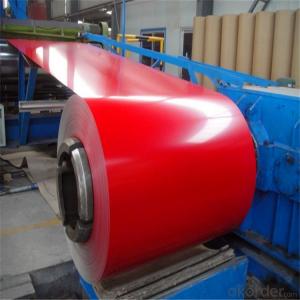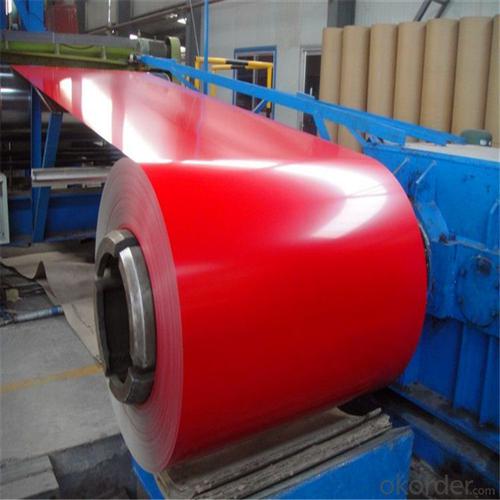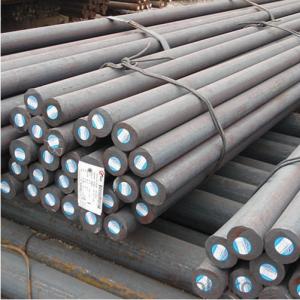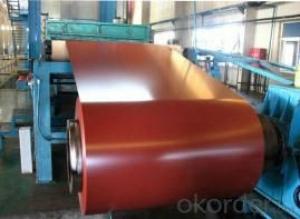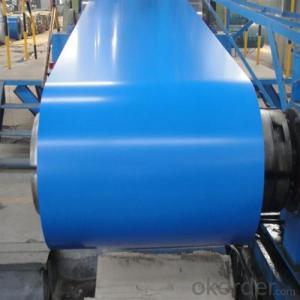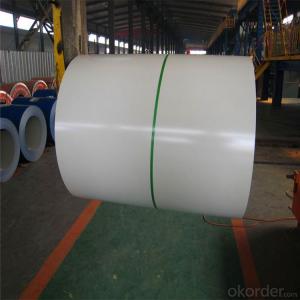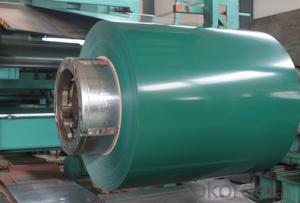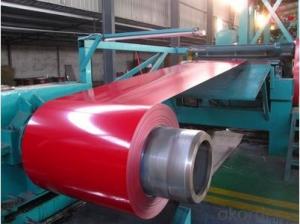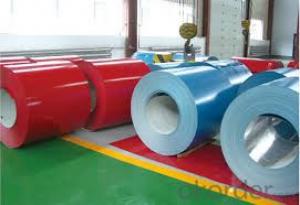0.4 0.5 1.5 2mm Thickness Color GI Coil PPGI Steel Coil DX51D
- Loading Port:
- Tianjin
- Payment Terms:
- TT OR LC
- Min Order Qty:
- 100 m.t.
- Supply Capability:
- 500000 m.t./month
OKorder Service Pledge
OKorder Financial Service
You Might Also Like
Specification
0.5 1.5 2mm Thickness Color GI Coil PPGI Steel Coil DX51D
Description of 0.5 1.5 2mm Thickness Color GI Coil PPGI Steel Coil DX51D
Product | PPGI/PPGL |
Capacity | 5,000 tons/month |
Base material | Hot dipped galvanized steel |
Thickness | 0.2-2.0mm |
Width | 600-1250mm(according to your need) |
Coil Weight | 3-6tons |
Quality | SGCC, DX51D |
Color | RAL No. or customers samples’ color |
Zinc-coating | 30g/m2-180g/m2 |
Coil ID | 508mm/610mm |
Technique | Cold rolled—hot dipped galvanized—color coated |
Painting | Top painting:15~25μm |
Back painting: 6~10μm | |
Tolerance | Thickness: +/-0.02mm |
Width:+/-2mm | |
Shipment time | within 15-45 workdays |
Payment | T/T, L/C at sight |
Packing | Standard export packing |
The special order can be negotiated. | |
Application of 0.5 1.5 2mm Thickness Color GI Coil PPGI Steel Coil DX51D
APPLICATION OF OUR PREPAINTED STEEL | ||||||||||
Construction | Outside | Workshop,agricultural warehouse,residential precast unit | ||||||||
corrugated roof,roller shutter door,rainwater drainage pipe,retailer booth | ||||||||||
Inside | Door,doorcase,light steel roof stucture,folding screen,elevator,stairway,ven gutter,Construction Wall | |||||||||
Electrical applicance | Refrigerator,washer,switch cabnet,instrument cabinet,air conditioning,micro-wave owen,bread maker | |||||||||
Fuiniture | Central heating slice,lampshade,chifforobe,desk,bed,locker,bookself | |||||||||
Carrying trade | Exterior decoration of auto and train,clapboard,container,isolation lairage,isolation board | |||||||||
Qthers | Writing panel,garbagecan,billboard,timekeeper,typewriter,instrument panel,weight sensor,photographic equipment | |||||||||
Products Show of 0.5 1.5 2mm Thickness Color GI Coil PPGI Steel Coil DX51D

Product Advantages
1.With nearly 20 years experience in prepainted steel, accommodate different marketdemands. | ||||||||||||||
2.'Quality first, service first' is our business aim; 'The good faith get respect,cast quality market' is our Business philosophy . | ||||||||||||||
3.Having two series producttion line,with the abbual production capacity of 240000 tons. | ||||||||||||||
4.Exceed International ISO9001:2008&ISO14001:2004 quality and environmental standards | ||||||||||||||
5.Meet with ROHS standard |
Company Information
CNBM International Corporation is the most important trading platform of CNBM group.
Whith its advantages, CNBM International are mainly concentrate on Cement, Glass, Iron and Steel, Ceramics industries and devotes herself for supplying high qulity series of refractories as well as technical consultancies and logistics solutions.


F A Q
1, Your advantages?
professional products inquiry, products knowledge train (for agents), smooth goods delivery, excellent customer solution proposale
2, Test & Certificate?
SGS test is available, customer inspection before shipping is welcome, third party inspection is no problem
3, Factory or Trading Company?
CNBM is a trading company but we have so many protocol factories and CNBM works as a trading department of these factories. Also CNBM is the holding company of many factories.
4, Payment Terms?
30% TT as deposit and 70% before delivery.
Irrevocable L/C at sight.
5, Trading Terms?
EXW, FOB, CIF, FFR, CNF
6, After-sale Service?
CNBM provides the services and support you need for every step of our cooperation. We're the business partner you can trust.
For any problem, please kindly contact us at any your convenient time.
We'll reply you in our first priority within 24 hours.
- Q: How is heat-resistant steel used in high-temperature applications?
- Heat-resistant steel is used in high-temperature applications due to its ability to withstand elevated temperatures without losing its structural integrity. This type of steel is commonly used in industries such as aerospace, power generation, and petrochemicals, where it is essential to maintain the strength and performance of components exposed to extreme heat. Heat-resistant steel is used in the construction of furnaces, boilers, heat exchangers, and other equipment that operate under high temperatures, ensuring their reliability and longevity even in challenging environments.
- Q: What are the different surface hardening techniques for special steel?
- To enhance the mechanical properties and improve the wear resistance of special steel, there exists a range of surface hardening techniques that can be employed. These techniques encompass: 1. Case hardening: Through diffusion, carbon or nitrogen is introduced into the steel surface. By subjecting the steel to an environment rich in carbon or nitrogen, the atoms disseminate into the surface layer, resulting in the creation of a hardened case while maintaining a resilient core. 2. Nitriding: The process of introducing nitrogen into the steel surface to enhance its hardness is known as nitriding. By placing the steel in an environment abundant in nitrogen at elevated temperatures, a hardened surface layer is formed, exhibiting improved resistance to wear and corrosion. 3. Carburizing: Carbon is introduced into the steel surface through carburizing. By heating the steel in an environment rich in carbon, the carbon atoms diffuse into the surface layer, leading to the development of a hardened case with heightened hardness and wear resistance. 4. Induction hardening: Utilizing an induction coil, induction hardening is a localized technique for surface hardening. The steel is heated using the induction coil and then swiftly quenched, resulting in a hardened surface layer characterized by high hardness and enhanced wear resistance. 5. Flame hardening: Flame hardening is an alternative localized method for surface hardening. The steel surface is heated using a high-temperature flame and swiftly quenched. This technique generates a hardened surface layer with increased hardness and resistance to wear. 6. Laser hardening: Laser hardening is a precise and localized surface hardening technique. By employing a laser beam to heat the desired area of the steel, followed by rapid quenching, a hardened surface layer with enhanced mechanical properties is formed. By employing these surface hardening techniques, special steel can experience significant improvements in durability, strength, and resistance to wear and corrosion, making it highly suitable for diverse industrial applications. The selection of the most suitable technique is contingent upon factors such as the desired level of hardness, the complexity of the steel component, and the specific requirements of the application.
- Q: What are the applications of special steel in the marine sector?
- Special steel, also known as marine grade steel, offers a wide range of applications in the marine sector. One of the key uses of special steel in this industry is for shipbuilding. Special steel is highly resistant to corrosion, making it ideal for the construction of ships and other marine vessels that are constantly exposed to harsh weather conditions and saltwater. Another significant application of special steel in the marine sector is for offshore structures. Offshore platforms, such as oil rigs and wind turbines, require materials that can withstand the harsh marine environment, including corrosion, high pressure, and extreme temperatures. Special steel is known for its exceptional strength and durability, making it a preferred choice for these structures. Additionally, special steel is also used in the manufacturing of marine equipment and components. For example, propeller shafts, anchor chains, and underwater pipelines are often made from special steel due to its excellent mechanical properties and resistance to corrosion. Special steel is also used in the production of marine engines, ensuring reliable performance and longevity in marine applications. Furthermore, special steel is utilized in the construction of port infrastructure, such as piers, docks, and harbor structures. These structures need to withstand the constant exposure to sea water, heavy loads, and dynamic forces, making special steel an ideal material choice for their construction. In conclusion, the applications of special steel in the marine sector are numerous and vital. Its corrosion resistance, strength, and durability make it an essential material for shipbuilding, offshore structures, marine equipment, and port infrastructure. The utilization of special steel ensures the longevity and reliability of marine assets while operating in harsh marine environments.
- Q: How does special steel contribute to the longevity of products?
- There are several ways in which special steel contributes to the longevity of products. To begin with, its exceptional strength and durability are well-known. Special steel is specifically designed to endure extreme conditions, such as high temperatures, pressure, and corrosive environments. This makes it highly suitable for use in various industries, including aerospace, automotive, and construction. The remarkable strength of special steel enables products to bear heavy loads and resist deformation, ensuring they remain intact and functional for a prolonged period of time. For example, in the construction industry, special steel is frequently employed in structural components like beams and columns, which provide crucial support and stability to buildings over many years. Furthermore, special steel possesses excellent resistance to wear and abrasion. It can endure constant friction, impact, and contact with other materials without significant deterioration. This characteristic is vital in industries where products are subjected to continuous use, such as machinery, tools, and equipment. The utilization of special steel in these applications guarantees that the products remain in good working condition for an extended period, reducing the need for frequent repairs or replacements. Additionally, special steel exhibits exceptional resistance to corrosion, making it highly resistant to rust and other forms of corrosion. This property is especially advantageous in products exposed to harsh environments or chemicals, like marine vessels, pipelines, and chemical processing equipment. Through the utilization of special steel, manufacturers can significantly prolong the lifespan of these products, minimizing the risk of failure or breakdown due to corrosion. In conclusion, special steel contributes to the longevity of products through its provision of superior strength, durability, wear resistance, and corrosion resistance. Its extraordinary properties enable products to withstand harsh conditions, heavy loads, and continuous use, guaranteeing that they remain functional and reliable for an extended period. By incorporating special steel into their designs, manufacturers can greatly enhance the lifespan of their products, leading to cost savings, improved reliability, and customer satisfaction.
- Q: What are the main characteristics of creep-resistant steel?
- Creep-resistant steel, characterized by its high resistance to deformation caused by prolonged exposure to high temperatures and stress, possesses several key features: 1. It can withstand extremely high temperatures without significant deformation, making it ideal for applications in power plants, boilers, and gas turbines, where materials are exposed to elevated temperatures for extended periods. 2. It exhibits excellent mechanical properties, including high tensile strength and toughness, enabling it to endure stress and pressure, even at high temperatures. 3. It is highly resistant to corrosion and oxidation, owing to its alloying with elements like chromium, molybdenum, and nickel. This makes it suitable for use in environments with moisture, chemicals, and gases. 4. It maintains its shape and size under prolonged exposure to high temperatures and stress, ensuring dimensional stability and preserving the integrity of structures or components. 5. Its combination of high temperature resistance, strength, and corrosion resistance contributes to its durability and longevity, reducing the need for frequent maintenance and replacement. This improves the overall efficiency and cost-effectiveness of applications relying on creep-resistant steel. In conclusion, creep-resistant steel is specifically designed to endure the challenging conditions of high temperatures and stress, making it the preferred choice in industries prioritizing reliability and safety.
- Q: How does the addition of nickel enhance the properties of special steel?
- The properties of special steel are enhanced in several ways through the addition of nickel. To begin with, the strength of steel is increased by nickel, resulting in enhanced durability and resistance to deformation. This is particularly crucial in situations where the steel will be exposed to high temperatures or heavy loads. Additionally, the corrosion resistance of steel is improved by nickel. When exposed to moisture or harsh chemicals, nickel forms a protective oxide layer on the steel's surface, preventing rusting or corrosion. This is particularly valuable in industries like marine, aerospace, and chemical processing, where steel is frequently subjected to corrosive environments. Furthermore, the toughness of steel is improved by nickel, allowing it to withstand impact or sudden temperature changes without fracturing or cracking. This makes it suitable for applications that require high resistance to shock or vibration, such as construction, automotive, or machinery manufacturing. Moreover, nickel enhances the heat resistance of steel. By increasing the steel's ability to retain strength and shape at high temperatures, nickel makes it suitable for use in high-temperature environments, such as power generation, oil and gas, or furnace systems. In conclusion, the addition of nickel to special steel enhances its strength, corrosion resistance, toughness, and heat resistance. These improved properties make nickel-enhanced steel highly desirable in a wide range of industries and applications, where durability, reliability, and performance under challenging conditions are of utmost importance.
- Q: What are the main characteristics of tool steel forgings?
- Tool steel forgings possess a variety of qualities that render them highly valuable for diverse applications. Primarily, tool steel forgings are renowned for their remarkable durability and strength. They are specifically engineered to endure significant levels of stress, making them ideal for situations where toughness and resistance to wear and tear are indispensable. This strength empowers tool steel forgings to retain their shape and integrity even under extreme circumstances, such as elevated temperatures or heavy loads. Another noteworthy characteristic of tool steel forgings is their exceptional hardness. Through the process of quenching and tempering, tool steel achieves substantial levels of hardness. This technique involves heating the steel to a precise temperature and rapidly cooling it. This hardness endows tool steel forgings with remarkable resistance to abrasion, making them well-suited for activities involving cutting, shaping, and molding materials. Furthermore, tool steel forgings exhibit superb dimensional stability. Consequently, they experience minimal distortion or shrinkage when exposed to heat or pressure. This quality renders them ideal for applications that demand precision tooling. Moreover, their dimensional stability ensures that the forgings maintain their accuracy and reliability over time, a crucial aspect in industries such as manufacturing and engineering. Additionally, tool steel forgings offer excellent machinability, meaning they can be conveniently shaped, drilled, and cut to fulfill specific requirements. This versatility and adaptability enable their utilization in a wide range of applications, from forming intricate shapes to crafting elaborate designs. Lastly, tool steel forgings possess outstanding wear resistance. This characteristic enables them to retain their cutting edges and surfaces for prolonged periods, thereby reducing the need for frequent sharpening or replacement. This wear resistance proves especially advantageous in industries such as automotive, aerospace, and tool manufacturing, where longevity and efficiency are paramount. In conclusion, the primary qualities of tool steel forgings encompass exceptional durability and strength, high hardness, excellent dimensional stability, good machinability, and excellent wear resistance. These characteristics bestow tool steel forgings with immense desirability across various industries, where reliability, precision, and longevity are crucial.
- Q: What are the different methods of protecting special steel against corrosion?
- There exists a variety of techniques for safeguarding special steel from corrosion. Some commonly employed methods are as follows: 1. Application of Coatings: One of the most efficient approaches to prevent corrosion is to apply a protective coating onto the steel surface. This can be accomplished using diverse techniques like hot-dip galvanization, electroplating, or painting. The coatings act as a barrier, effectively preventing moisture and corrosive substances from coming into contact with the steel. 2. Utilization of Cathodic Protection: This method involves the use of either a sacrificial anode or an impressed current to shield the steel. In sacrificial anode cathodic protection, a more reactive metal is connected to the steel, thereby causing the sacrificial metal to corrode instead of the steel. Conversely, impressed current cathodic protection employs an external power source to provide a continuous flow of electrons, thus halting the corrosion process. 3. Alloying: The addition of specific elements to special steel can enhance its resistance against corrosion. For instance, stainless steel contains chromium, which forms a passive oxide layer on the surface, providing protection against corrosion. Likewise, the inclusion of elements like nickel, molybdenum, or copper can improve the steel's resistance to corrosion. 4. Passivation: Passivation is a chemical process that involves treating the steel with an acid solution to eliminate any impurities present on the surface. This process facilitates the formation of a protective oxide layer, thereby preventing further corrosion. 5. Use of VCI (Volatile Corrosion Inhibitors): VCI compounds are chemicals that emit vapors, forming a protective layer on the steel surface. This layer acts as a barrier, effectively safeguarding the steel against moisture and corrosive substances, thereby preventing corrosion. 6. Proper Maintenance and Cleaning: Regular maintenance and cleaning of the steel surface can significantly prolong its lifespan and prevent corrosion. By eliminating dirt, debris, and corrosive substances from the surface, the likelihood of corrosion is greatly reduced. It is essential to note that the selection of the appropriate method relies on various factors, such as the type of steel, the environmental conditions it will be exposed to, and the expected lifespan. Seeking guidance from corrosion experts or engineers can aid in determining the most suitable method for protecting special steel against corrosion.
- Q: How is alloy steel different from carbon steel?
- Alloy steel is different from carbon steel because it is made by adding other elements to carbon steel, such as chromium, nickel, or manganese, to enhance its properties. This makes alloy steel stronger, more resistant to corrosion, and better suited for specific applications compared to carbon steel, which is primarily composed of iron and carbon.
- Q: How does special steel perform under low temperatures?
- Special steel performs well under low temperatures due to its high ductility, toughness, and resistance to brittleness. It retains its strength and structural integrity, making it ideal for applications in extreme cold environments such as cryogenic storage, sub-zero manufacturing, and Arctic exploration.
Send your message to us
0.4 0.5 1.5 2mm Thickness Color GI Coil PPGI Steel Coil DX51D
- Loading Port:
- Tianjin
- Payment Terms:
- TT OR LC
- Min Order Qty:
- 100 m.t.
- Supply Capability:
- 500000 m.t./month
OKorder Service Pledge
OKorder Financial Service
Similar products
Hot products
Hot Searches
Related keywords
